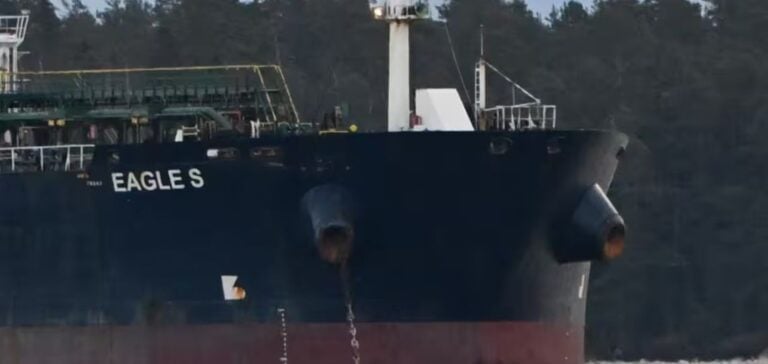The suspected sabotage of the EstLink 2 undersea cable, a key energy infrastructure linking Finland and Estonia, has prompted an in-depth investigation by Finnish authorities. The Eagle S tanker, flying the Cook Islands flag, is now under scrutiny, with seven crew members banned from traveling.
Finnish investigators identified a 40-kilometer “trail” on the seabed, suggesting deliberate action. The National Bureau of Investigation (NBI) confirmed that the Eagle S was present over the affected area at the time of the incident on Christmas Day.
Legal measures and investigation progress
The vessel was escorted to Kilpilahti harbor, east of Helsinki, where underwater inspections and crew interrogations are ongoing. According to Elina Katajamäki, lead investigator at the NBI, the travel bans imposed on the suspects aim to ensure witness availability while preventing interference in the investigation.
“The travel ban is a less intrusive measure than arrest but is essential to protect the integrity of the investigation,” Katajamäki stated. This decision comes as the number of suspects may still rise as new evidence is analyzed.
Strategic context and Baltic Sea tensions
Incidents targeting critical infrastructure in the Baltic Sea have increased since Russia’s 2022 invasion of Ukraine. The Eagle S is suspected of being part of a Russian “ghost fleet,” a network of vessels used to transport hydrocarbons in violation of international sanctions. This type of network has previously been linked to similar cases targeting energy and communication cables in this strategic region.
In response, NATO has announced plans to bolster its military presence in the Baltic Sea, a maritime space where commercial, military, and political interests intersect. The alliance underscored the importance of securing undersea infrastructures, which have become prime targets in hybrid warfare scenarios.
European initiatives to secure cables
In reaction to the escalating threats, the European Union has strengthened its mechanisms for protecting critical infrastructure. Measures include improving detection technologies, enhancing international cooperation, and deploying rapid undersea repair capabilities.
However, the ongoing vulnerability of these undersea networks underscores the urgency for EU member states to invest more in their protection. The recurring attacks also raise questions about energy resilience and strategic sovereignty amid prolonged tensions between Russia and NATO countries.






















